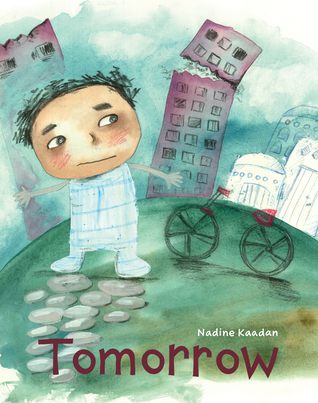 Tomorrow
Tomorrow
Written and illustrated by Nadine Kaadan
Lantana Publishing, 2018, 32 pp
ISBN: 9781913747152
Admittedly, I know little about Syria beyond the news coverage of war and refugee camps, and less about the book highlighted in this review, Tomorrow, and its author and illustrator, Nadine Kaadan. Tomorrow, set in the city of Damascus, Syria, is an example of how global literature encourages readers like me to expand their perspectives of how people live in different parts of the world.
Tomorrow tells the story of young Yazan who misses the days he went to the park and played with his friends. He doesn’t understand the changes in his mother and father, why he has to stay indoors, and why his mother doesn’t paint anymore. He observes, “Now, the minute she [wakes] up she [watches] the news with the volume turned up loud… SO LOUD.” Yazan’s parents try to protect Yazan from the war raging throughout the city, explaining, for example, that the reason they make many phone calls before leaving the house is to check on traffic conditions. Eventually, when Yazan cannot take the boredom of being stuck inside, he heads to the park on his bicycle, only to discover the world outside is vastly different from what he remembered: empty streets, the sounds of explosions in the distance, none of his playmates to be seen. His father finds him, and instead of being angry at Yazan for leaving the house without permission, he is silent. Yazan’s mother, on the other hand, explains that he cannot leave the house by himself, ever, and begins to paint again with Yazan, this time on the walls of the house, replicating the park he misses so much.
The real stand out for this book are Kaadan’s hauntingly provocative illustrations. She describes her pallet as “gloomy and dark,” and it is through those colors that the reader feels the tension between an endearing child and the harsh reality of war. For instance, on the first two-page spread when we first meet Yazan, he is sitting in a dark corner of a seemingly barren, colorless room, with a sideways gaze toward a yellow window, inviting the reader to consider how disconnected Yazan feels from the outside world that the window represents. The window appears on every page until Yazan leaves the house, as a symbolic reminder of what Yazan remembers about the city before the war. It disappears with Yazan’s innocence when he learns the truth of his situation and reappears as a symbol of hope when he and his mother begin to paint a playground on the walls inside his home. The subtlety and complexity of Kaadan’s artistic devices, such as the use of color, placement of characters within the settings, and movement of objects, make this book appropriate for a range of ages, from primary to intermediate aged readers. The illustrations serve as powerful opportunities for discussion as the story evolves.
The potential uses for Tomorrow in a classroom setting are substantial. It would work in a text set or paired with other books about war like the Librarian of Basra by Jeanette Winter (2019), The War Outside by Monica Hesse (2018), or The Cat Man of Aleppo by Karim Shamsi-Bashra and Irene Latham (2020). I also think that readers today will connect with Yazan’s emotional state, brought on from being forced to stay home, much in the same way children were shut in during the height of the COVID pandemic. Texts about COVID and the impact of being locked down to pair with Tomorrow could include When the World Went Quiet by Tia Martina (2020) or And the People Stayed Home by Kitty O’Meara (2020).
Nadine Kaadan is an award-winning author from Damascus, Syria, who now lives in the United Kingdom. Her books are inspired by her rich Syrian heritage, and her commitment to helping child refugees in Europe and the Middle East. In the afterward, written as a letter to the reader, Kaadan explains, “I wrote this story because I saw children like Yazan in my hometown of Damascus. Their lives were changing, and they couldn’t understand why. All of a sudden, the Fridays that were supposed to mark our weekends became frightening instead of fun. Families were afraid to go outside and instead stayed home.”
Tracy Smiles, Prescott, AZ
Authors retain copyright over the vignettes published in this journal and grant the journal right of first publication with the work simultaneously licensed under the following Creative Commons License:
WOW Review, Volume XIV, Issue 3 by Worlds of Words is licensed under a Creative Commons Attribution-NonCommercial-ShareAlike 4.0 International License. Based on work at https://wowlit.org/on-line-publications/review/xiv-3/7
WOW review: reading across cultures
ISSN 2577-0527
